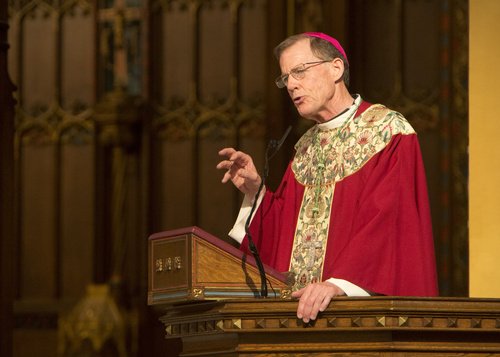This is an archived article that was published on sltrib.com in 2014, and information in the article may be outdated. It is provided only for personal research purposes and may not be reprinted.
A document issued Monday in Rome was portrayed as "stunning" and a "seismic shift" in the way the Catholic Church deals with gay people.
But it also is preliminary and subject to the vagaries of a quick translation into English, noted Catholic observers in Utah.
"It's a rough and ready translation and it [the Vatican] tells you upfront this is not official," said Scott Dodge, a deacon at Salt Lake City's Cathedral of the Madeleine.
Dodge blogged Monday about the document, a summary of the first week of closed-door deliberations by bishops meeting for a synod on family life, called by Pope Francis. A final version is expected after the synod ends this coming weekend, and it will frame the debate for a second such bishops' meeting next October.
The document focuses mostly on how the Catholic Church can recognize the good in relationships that are not what the church wants: couples who cohabitate, remarry after divorce or have same-sex partners. The aim is to come up with a pastoral approach to better reach, teach and attract such Catholics back to full participation in the church.
The bishops, Dodge said, are asking, "How do we take these doctrines … and apply them to the real situations real people find themselves in? You can only meet people where they are."
Most of the buzz Monday concerned a short section on gays.
"Homosexuals have gifts and qualities to offer to the Christian community: Are we capable of welcoming these people, guaranteeing to them a fraternal space in our communities? …. Accepting and valuing their sexual orientation, without compromising Catholic doctrine on the family and matrimony?"
The document also acknowledges good in such unions.
"Without denying the moral problems connected to homosexual unions it has to be noted that there are cases in which mutual aid to the point of sacrifice constitutes a precious support in the life of the partners."
Dodge said it will be interesting to see if the final document is phrased the same way.
"I like that it was posed as a question. It's a question that deserves some reflection."
Bishop John C. Wester, leader of Utah's 300,000 Catholics, said the tone of the document is in keeping with the pope's pastoral approach.
"The Catholic Church proclaims the good news of Jesus Christ, and the good news is that Jesus Christ loves us," he said. "We want to look as compassionately and with as much mercy as we can on situations people find themselves in … so that we might support them and help them move toward the truth and their ultimate good."
The bishops' document spoke of the "principle of gradualness" — that people move step by step toward holiness — and that's good," Wester said. "We have to build on that goodness rather than treat people as if they are pariahs."
Church doctrine is not being examined so much as its pastoral application, the bishop said.
A key pastoral issue everywhere involves Catholics who are validly married in the church, get civil divorces and then remarry. Such Catholics are not allowed to receive the church's central sacrament, Communion, because they are presumed to be adulterers. That causes a great deal of heartache.
Jesus taught that marriage is indissoluble, Wester said, and "the church always wants to uphold the sanctity of marriage."
But the document shows the bishops are exploring ways to accommodate such members. "Certainly there could be more of an embrace of people," he said. "How far the embrace can go because of the doctrines is not clear."
The document indicates several ways the church could streamline the annulment process to help more people who divorce. Those who want to remarry with the church's blessing must petition a church tribunal for an annulment, a declaration that the marriage was never valid in the first place.
The document calls for increased understanding among Catholics about family, better marriage preparation and support for families after marriage. It reiterates the church's position that all marriages must be open to children, but spends little time on the issue of contraception.
Dodge, who works with couples preparing for marriage and runs the cathedral's faith formation program for adults, hopes for more concrete instructions, even though he's been finding pastoral answers to these issues for years.
"Good, sound guidance that reflects the complexity of these issues," Dodge said, "would be more than welcome by everybody."
The Rev. Erik Richtsteig, pastor of St. James the Just Parish in Ogden, said he worries how the document will be received, even though it signals no change in church teaching.
If people assume the church is changing its doctrines on premarital sex, remarriage or same-sex unions, that would be bad, he said. "My real fear is people will misinterpret it and their expectations will be raised."
When it doesn't happen, Richtsteig said, they'll only be angry.
Twitter: @KristenMoulton



